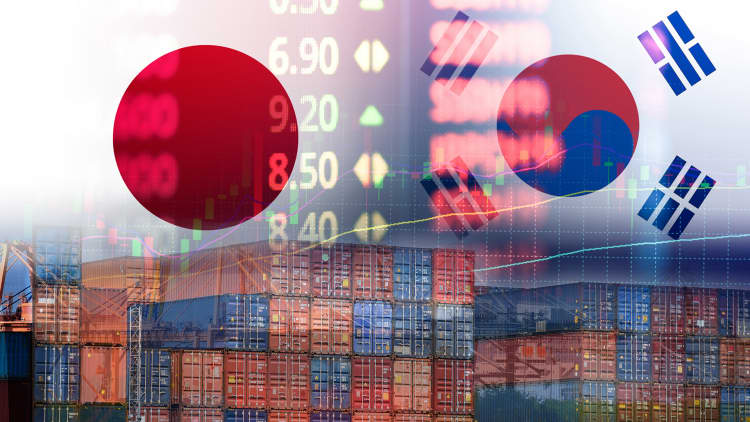The ongoing trade dispute between Japan and South Korea has begun to affect businesses across sectors and could potentially even make a dent in the global economy.
The political disagreement stems from an argument about Japan's conduct during the second World War, but it's recently spilled into the economic arena. In early July, Japan restricted exports of materials critical to South Korea's semiconductor industry, citing national security concerns and a lack of trust in Korea.
Korea is now bracing for Japan's decision to drop it from the list of countries that enjoy minimum trade restrictions, Seoul's finance minister said recently.
She added that, if Seoul is to be removed from the list, "relations between the two countries would worsen to uncontrollable levels," according to a Reuters report. Companies, she said, are prepared for a possible fallout that may come as soon as Friday.
Business operations interrupted
The continued disagreement between the two East Asian powerhouses is going to damage both countries' economies across multiple industries, said Jesper Koll, senior advisor at asset management company WisdomTree Investments in Japan.
Among those negatively affected by the dispute are basic materials companies, he added. Japan's chemical companies , for one, had "made a big push into Korea over the past decade and they are now de-facto boycotted and are beginning to report steep production cuts," Koll said.
The senior advisor added that, in the short term, supply disruption in the chemicals needed for semi-conductors "will force higher prices for consumers, lower profits for companies," but it may also "trigger a boom for corporate strategists and entrepreneurs."
Disrupted supply chains, Koll explained, are likely to give rise to "new players."
Aside from the direct impacts coming from the export restrictions, some consumer-facing companies are beginning to feel the pressure of worsening relations between the two countries.
"It is bad news for Japanese cosmetics companies who saw more than 10% of their sales growth coming from Korean demand growth in past two years but are now beginning to feel a buyers-strike from Korean women," said Koll.
Tourism, airlines, restaurants and luxury brand boutiques are also starting to feel the pain, Koll told CNBC.
In fact, Korea sends the most tourists to Japan after China, according to JTB Tourism Research and Consulting. Japanese tourists to Korea, meanwhile, make up the largest group of visitors from the Asia Pacific region, according to the Korea Tourism Organization.
An apparent drop in tourism between the two nations — attributed to the political dispute — has led many major airlines to trim the number of flights or even terminate direct routes between major Japanese and Korean cities.
Japan's English newspaper Nikkei reported on Wednesday that Korean Air and budget carrier T'way Air will reduce flights to Japan amid the tensions. According to that report, the two airlines decided to cut low-profit routes due to market pressures rather than any boycotts by South Korean travelers to Japan.
Separately, Korean Air (South Korea's largest airline) announced that, starting September, it will suspend flights between Korea's port city Busan and Sapporo, the capital city of Japanese province Hokkaido.
Korea's second-largest carrier, Asiana Airlines, announced on Tuesday that it plans to switch to smaller planes for some routes between Japan and Korea starting in September due to declining demand amid escalating economic and political tensions.

Air Seoul, a Korean budget carrier, has similarly announced that it will cut back regular flights connecting the two nations, according to a report by The Korea Times.
Other major Korean companies that have cited operations being affected by the disagreement include tech giants Samsung and LG Electronics.
LG said this week that it may be affected by tough business conditions and uncertainties spurred by both the U.S.-China trade war and the Japan- Korea dispute.
Meanwhile, a Samsung executive said on the company's earnings call on Wednesday that "even though the recent measures by the Japanese government do not ban the export materials, we are facing difficulties due to the burden of this new export approval process, and the uncertainties that this new process would bring."
But it's not all bad for Korean companies. South Korean consumer goods may come out as winners while the trade tensions escalate. In fact, shares of some Korean confectionery, stationary and clothing companies have seen double-digit percentage gains on the expectation that consumers will avoid buying products from Japanese competitors.
Ripple effects
Troy Stangarone, a senior director at the Washington-based Korea Economic Institute, said Wednesday he anticipates a global ripple effect from any action taken to limit Japanese exports of sensitive materials to South Korea.
A lot of focus has been on semiconductor fabrication, said Stangarone, but a major move would also impact the petrochemical industry, which is a critical export sector for South Korea.

In the short term, Stangarone said, tourism from Korea to Japan may face the biggest impact, but the medium term could see new bilateral foreign direct investment decline as "confidence wanes."
But more importantly, in the long term, the weaponization of trade "will come at the cost of efficiencies gained through decades of building supply chains across the Asia-Pacific and beyond," Stangarone said.
"This will act as a drag on the global economy," he warned.
Last Friday, a senior U.S. official expressed willingness to hold a trilateral meeting with Japan and South Korea in Thailand, according to Japan Today.
The senior State Department official, who reportedly requested to remain anonymous said the White House is "looking for ways to incentivize" the two nations to address their disagreements "in a productive way that benefits both sides."
U.S. Secretary of State Mike Pompeo, Japanese Foreign Minister Taro Kono and South Korean Foreign Minister Kang Kyung-wha are among top diplomats set to meet on Thursday at the ASEAN Regional Forum, a 27-member regional security forum.
— Reuters and CNBC's Chery Kang contributed to this report.


